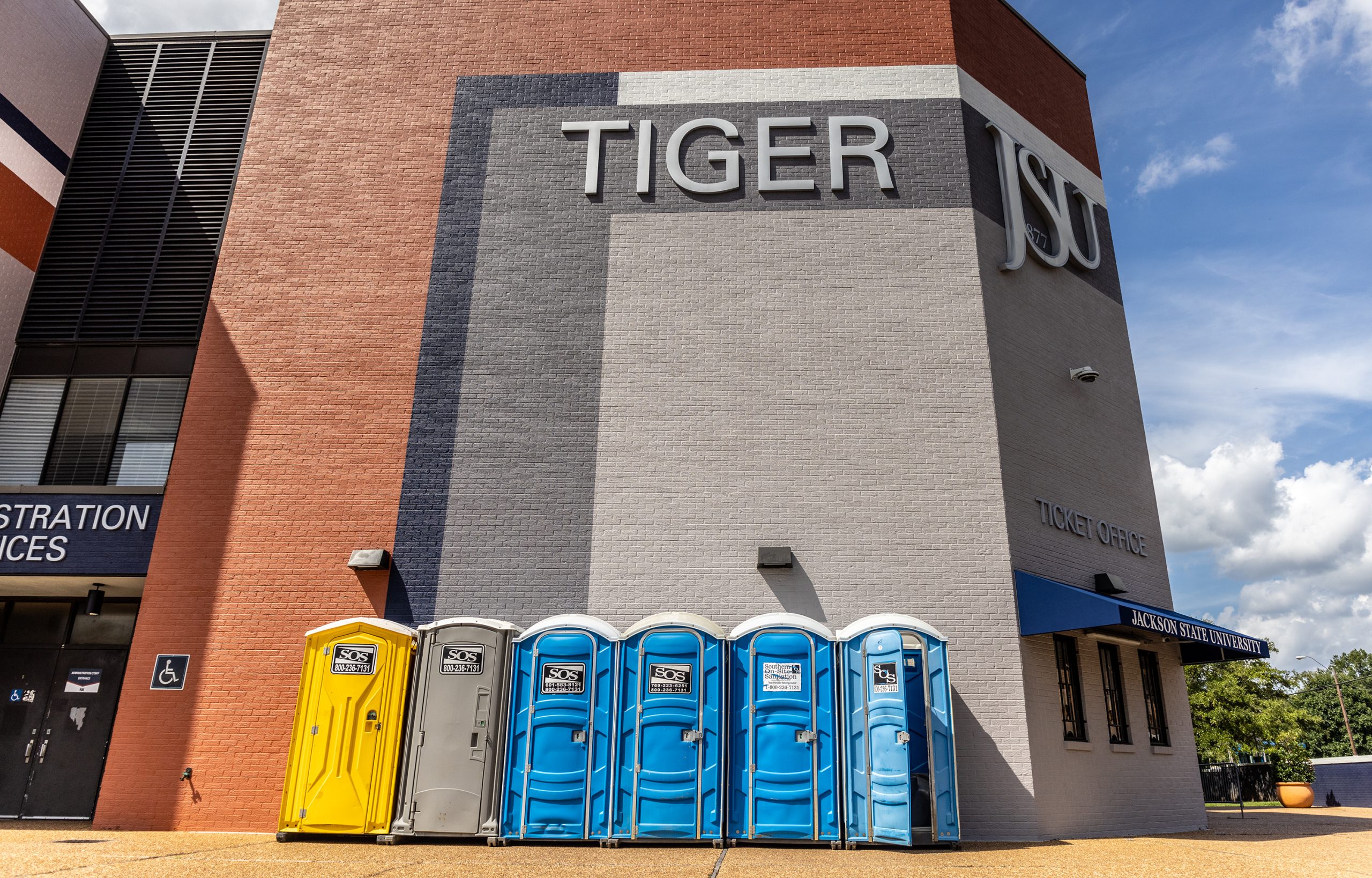Mississippi Today
JSU students pleading for fixes to campus water system as officials quietly seek funding
JSU students pleading for fixes to campus water system as officials quietly seek funding
While Jackson State University officials are quietly working to pull funding for an improved campus water system, students continue to complain of inadequacies.
The historically Black university, situated in the oldest neighborhood in the capital city, has struggled with unreliable water for years — even when there’s not an acute crisis.
Students who live in on-campus dorms are particularly struggling. The aging cast iron and lead lines under the university routinely burst, which can make the water smell foul or turn brown. In the winter, freezing temperatures have left students without heat, because the system relies on running water. They’ve had to buy bottled water, use portable showers and live in hotels.
These conditions make it more difficult for students to focus on the reason they’re at Jackson State — to learn. And, the problems could hurt the university’s bottom line: Enrollment.
Former President Thomas Hudson — before he was placed on administrative leave —had pledged to get clean, safe water at Jackson State. One of his priorities this session was a $17 million request for state funding for campus infrastructure, including the water system. That goal, Hudson had indicated, has the support of the governor and lieutenant governor. Several lawmakers have introduced bills to get the university funding for projects related to its water system.
Before Hudson was placed on leave, the university had declined to comment on its efforts. His temporary replacement, Elayne Hayes-Anthony, has said she will continue to support the university’s legislative priorities. Concrete details from the lawmakers have been hard to come by.
Now, some students say they want to know what exactly the university’s administration has been doing to fix the problems on campus.

“Not knowing only adds suspicion to where it’s actually going,” Amaya Baker, a junior, said of the university’s quest for funds.
Baker says it seems like the problems are never-ending in her dorm. Hot water has returned to showers, however, some residents’ washing machines are broken.
There is one plus side: Baker started at Jackson State in the fall of 2020, while pandemic restrictions were in place. Now, she can at least spend more time with friends.
Jackson State is a public institution supported by the state of Mississippi. Tatyana Ross, a senior, said the university shouldn’t have to beg for state funding.

At the end of the day, administrators can request more money, but that doesn’t mean lawmakers will approve it, Ross said.
“It’s not new: Jackson State started off as a school for Negro teachers,” Ross said. “It feels like the state government continues to attempt and disrupt the education of Black people. I believe that it all shows how oppressed African Americans remain in today’s time.”
Hudson said in a February interview that his administration is working to get funds for the university to build its own campus water supply, new water lines and a “redundant water supply” in case the city’s supply fails again.
The university has declined to discuss the administration’s efforts to get a new water supply.
Alonda Thomas, the university’s communications director, wrote in a February email that JSU did not want to discuss its legislative efforts to get a new water system.
“We’re going to pass at this time,” she wrote. “We’ll wait until the session closes and if the study is approved, we’ll discuss the findings once the study is conducted.”
An opaque funding process
At a town hall last year, Hudson told students the first step to securing funding for a new water system on campus is to get money for a study. It’s a process similar to the one Jackson State undertook to get funding for a stadium feasibility study. A feasibility study looks at a range of factors to determine how possible a construction project is.
The university is already pursuing water-related projects using about $2 million in federal pandemic relief funds that flowed through the Department of Finance and Administration. A spokesperson for the department said the details of those projects aren’t yet finalized.
In a statement, Michael Bolden told Mississippi Today and Open Campus that the funds from DFA will provide an “intermediate solution” for the water issues on campus and “a more comprehensive plan for the entire campus.”
“The initial funds provided will inform the details of a more comprehensive emergency water delivery system during times of low to no water pressure events,” the executive director of campus operations said.
So far this session, four measures seeking funding for Jackson State infrastructure improvements —House Bill 189, House Bill 1353, House Bill 1389 and Senate Bill 2969 — have died in committee.
But, this is typical. In the Mississippi Legislature, stalled proposals seeking appropriations or bond funding are often revived in one large bill toward the end of session.
Sen. Derrick Simmons, D-Greenville, said of his bill (SB 2969) that “it was important to file so it could be of record, but if the bill dies … it’s not like all is lost.”
Simmons’ appropriations bill asked for $8 million “for the purpose of defraying the expenses of repair, renovation and/or upgrades to the university’s water system and related infrastructure.” He said an university official from external affairs said that’s how much the university would need, but he couldn’t say if it would go toward a study or to actual infrastructure improvements.
Simmons said he proposed the bill because he’d heard concerns that the city’s water crisis has led to declining enrollment at JSU.

Students echoed that concern. Alora Arnold, a senior, said she regrets the decision to attend JSU because of the ongoing water issues.
Her full scholarship is what has kept her in Jackson.
“Had that not been the case, I would definitely transfer,” Arnold said.
Rep. Angela Cockerham, I-Magnolia, filed two similar bills that also requested $8 million in appropriations. She did not return multiple calls and texts from Mississippi Today.
Four Mississippi universities have their own water systems, according to the Institutions of Higher Learning, including Alcorn State University, Mississippi Valley State University, Mississippi State University, and the University of Mississippi.
The University of Mississippi Medical Center uses its own water source for about 90% of campus with the remaining coming from the city, according to the Institutions of Higher Learning.

Matthew Adams, a junior, says the water issues on campus have left him feeling alone and dampened his social life.
“When you’re not able to shower because we’re without water or the showers aren’t getting warm, you don’t feel clean and you stink. I truly feel isolated. My dorm only has one working washing machine, so it’s hard to even get clean clothes.”
Rep. John Hines, D-Greenville, was the third lawmaker to file a bill that would have gotten Jackson State money for infrastructure improvements. He noted one reason for the water troubles at Jackson State is that lawmakers have historically underfunded Mississippi’s HBCUs compared to the predominantly white institutions.
“I doubt if it passes simply because they really don’t want to admit that they had made the failures in providing funding for these institutions,” he said earlier in the session before the bill died.
In the meantime, Jackson State is also turning to private funding.
Bolden said the university has a pot of money — called the Jackson State University Gap Emergency Fund —that can supplement on-campus resources meant to help students navigate the problems. Other services he discussed include on-site counseling and the campus’s food pantry that offers bottled water, canned goods and personal hygiene products.

Jaiden Smith, a sophomore, returned home to St. Louis temporarily from Sept.1 to 3 last year during the water crisis. At that point in the crisis, students had gone days without laundry service and water on the upper floors. The university had to set up portable showers.
“I didn’t want to go to class or do fun events on campus because I couldn’t enjoy the basic necessities of a nice shower,” she said.
Molly Minta covers higher education for Mississippi Today, in partnership with Open Campus. Alivia Welch is an inaugural fellow in the HBCU Student Journalism Network, a project of Open Campus.
This article first appeared on Mississippi Today and is republished here under a Creative Commons license.
Mississippi Today
Presidents are taking longer to declare major natural disasters. For some, the wait is agonizing
TYLERTOWN — As an ominous storm approached Buddy Anthony’s one-story brick home, he took shelter in his new Ford F-250 pickup parked under a nearby carport.
Seconds later, a tornado tore apart Anthony’s home and damaged the truck while lifting it partly in the air. Anthony emerged unhurt. But he had to replace his vehicle with a used truck that became his home while waiting for President Donald Trump to issue a major disaster declaration so that federal money would be freed for individuals reeling from loss. That took weeks.
“You wake up in the truck and look out the windshield and see nothing. That’s hard. That’s hard to swallow,” Anthony said.
Disaster survivors are having to wait longer to get aid from the federal government, according to a new Associated Press analysis of decades of data. On average, it took less than two weeks for a governor’s request for a presidential disaster declaration to be granted in the 1990s and early 2000s. That rose to about three weeks during the past decade under presidents from both major parties. It’s taking more than a month, on average, during Trump’s current term, the AP found.
The delays mean individuals must wait to receive federal aid for daily living expenses, temporary lodging and home repairs. Delays in disaster declarations also can hamper recovery efforts by local officials uncertain whether they will receive federal reimbursement for cleaning up debris and rebuilding infrastructure. The AP collaborated with Mississippi Today and Mississippi Free Press on the effects of these delays for this report.
“The message that I get in the delay, particularly for the individual assistance, is that the federal government has turned its back on its own people,” said Bob Griffin, dean of the College of Emergency Preparedness, Homeland Security and Cybersecurity at the University at Albany in New York. “It’s a fundamental shift in the position of this country.”
The wait for disaster aid has grown as Trump remakes government
The Federal Emergency Management Agency often consults immediately with communities to coordinate their initial disaster response. But direct payments to individuals, nonprofits and local governments must wait for a major disaster declaration from the president, who first must receive a request from a state, territory or tribe. Major disaster declarations are intended only for the most damaging events that are beyond the resources of states and local governments.
Trump has approved more than two dozen major disaster declarations since taking office in January, with an average wait of almost 34 days after a request. That ranged from a one-day turnaround after July’s deadly flash flooding in Texas to a 67-day wait after a request for aid because of a Michigan ice storm. The average wait is up from a 24-day delay during his first term and is nearly four times as long as the average for former Republican President George H.W. Bush, whose term from 1989-1993 coincided with the implementation of a new federal law setting parameters for disaster determinations.
The delays have grown over time, regardless of the party in power. Former Democratic President Joe Biden, in his last year in office, averaged 26 days to declare major disasters — longer than any year under former Democratic President Barack Obama.

FEMA did not respond to the AP’s questions about what factors are contributing to the trend.
Others familiar with FEMA noted that its process for assessing and documenting natural disasters has become more complex over time. Disasters have also become more frequent and intense because of climate change, which is mostly caused by the burning of fuels such as gas, coal and oil.
The wait for disaster declarations has spiked as Trump’s administration undertakes an ambitious makeover of the federal government that has shed thousands of workers and reexamined the role of FEMA. A recently published letter from current and former FEMA employees warned the cuts could become debilitating if faced with a large-enough disaster. The letter also lamented that the Trump administration has stopped maintaining or removed long-term planning tools focused on extreme weather and disasters.
Shortly after taking office, Trump floated the idea of “getting rid” of FEMA, asserting: “It’s very bureaucratic, and it’s very slow.”
FEMA’s acting chief suggested more recently that states should shoulder more responsibility for disaster recovery, though FEMA thus far has continued to cover three-fourths of the costs of public assistance to local governments, as required under federal law. FEMA pays the full cost of its individual assistance.
Former FEMA Administrator Pete Gaynor, who served during Trump’s first term, said the delay in issuing major disaster declarations likely is related to a renewed focus on making sure the federal government isn’t paying for things state and local governments could handle.
“I think they’re probably giving those requests more scrutiny,” Gaynor said. “And I think it’s probably the right thing to do, because I think the (disaster) declaration process has become the ‘easy button’ for states.”
The Associated Press on Monday received a statement from White House spokeswoman Abigail Jackson in response to a question about why it is taking longer to issue major natural disaster declarations:
“President Trump provides a more thorough review of disaster declaration requests than any Administration has before him. Gone are the days of rubber stamping FEMA recommendations – that’s not a bug, that’s a feature. Under prior Administrations, FEMA’s outsized role created a bloated bureaucracy that disincentivized state investment in their own resilience. President Trump is committed to right-sizing the Federal government while empowering state and local governments by enabling them to better understand, plan for, and ultimately address the needs of their citizens. The Trump Administration has expeditiously provided assistance to disasters while ensuring taxpayer dollars are spent wisely to supplement state actions, not replace them.”

In Mississippi, frustration festered during wait for aid
The tornado that struck Anthony’s home in rural Tylertown on March 15 packed winds up to 140 mph. It was part of a powerful system that wrecked homes, businesses and lives across multiple states.
Mississippi’s governor requested a federal disaster declaration on April 1. Trump granted that request 50 days later, on May 21, while approving aid for both individuals and public entities.
On that same day, Trump also approved eight other major disaster declarations for storms, floods or fires in seven other states. In most cases, more than a month had passed since the request and about two months since the date of those disasters.
If a presidential declaration and federal money had come sooner, Anthony said he wouldn’t have needed to spend weeks sleeping in a truck before he could afford to rent the trailer where he is now living. His house was uninsured, Anthony said, and FEMA eventually gave him $30,000.
In nearby Jayess in Lawrence County, Dana Grimes had insurance but not enough to cover the full value of her damaged home. After the eventual federal declaration, Grimes said FEMA provided about $750 for emergency expenses, but she is now waiting for the agency to determine whether she can receive more.

“We couldn’t figure out why the president took so long to help people in this country,” Grimes said. “I just want to tie up strings and move on. But FEMA — I’m still fooling with FEMA.”
Jonathan Young said he gave up on applying for FEMA aid after the Tylertown tornado killed his 7-year-old son and destroyed their home. The process seemed too difficult, and federal officials wanted paperwork he didn’t have, Young said. He made ends meet by working for those cleaning up from the storm.
“It’s a therapy for me,” Young said, “to pick up the debris that took my son away from me.”
Historically, presidential disaster declarations containing individual assistance have been approved more quickly than those providing assistance only to public entities, according to the AP’s analysis. That remains the case under Trump, though declarations for both types are taking longer.
About half the major disaster declarations approved by Trump this year have included individual assistance.
Some people whose homes are damaged turn to shelters hosted by churches or local nonprofit organizations in the initial chaotic days after a disaster. Others stay with friends or family or go to a hotel, if they can afford it.
But some insist on staying in damaged homes, even if they are unsafe, said Chris Smith, who administered FEMA’s individual assistance division under three presidents from 2015-2022. If homes aren’t repaired properly, mold can grow, compounding the recovery challenges.

That’s why it’s critical for FEMA’s individual assistance to get approved quickly — ideally, within two weeks of a disaster, said Smith, who’s now a disaster consultant for governments and companies.
“You want to keep the people where they are living. You want to ensure those communities are going to continue to be viable and recover,” Smith said. “And the earlier that individual assistance can be delivered … the earlier recovery can start.”
In the periods waiting for declarations, the pressure falls on local officials and volunteers to care for victims and distribute supplies.
In Walthall County, where Tylertown is, insurance agent Les Lampton remembered watching the weather news as the first tornado missed his house by just an eighth of a mile. Lampton, who moonlights as a volunteer firefighter, navigated the collapsed trees in his yard and jumped into action. About 45 minutes later, the second tornado hit just a mile away.
“It was just chaos from there on out,” Lampton said.
Walthall County, with a population of about 14,000, hasn’t had a working tornado siren in about 30 years, Lampton said. He added there isn’t a public safe room in the area, although a lot of residents have ones in their home.
Rural areas with limited resources are hit hard by delays in receiving funds through FEMA’s public assistance program, which, unlike individual assistance, only reimburses local entities after their bills are paid. Long waits can stoke uncertainty and lead cost-conscious local officials to pause or scale-back their recovery efforts.

In Walthall County, officials initially spent about $700,000 cleaning up debris, then suspended the cleanup for more than a month because they couldn’t afford to spend more without assurance they would receive federal reimbursement, said county emergency manager Royce McKee. Meanwhile, rubble from splintered trees and shattered homes remained piled along the roadside, creating unsafe obstacles for motorists and habitat for snakes and rodents.
When it received the federal declaration, Walthall County took out a multimillion-dollar loan to pay contractors to resume the cleanup.
“We’re going to pay interest and pay that money back until FEMA pays us,” said Byran Martin, an elected county supervisor. “We’re hopeful that we’ll get some money by the first of the year, but people are telling us that it could be [longer].”
Lampton, who took after his father when he joined the volunteer firefighters 40 years ago, lauded the support of outside groups such as Cajun Navy, Eight Days of Hope, Samaritan’s Purse and others. That’s not to mention the neighbors who brought their own skid steers and power saws to help clear trees and other debris, he added.
“That’s the only thing that got us through this storm, neighbors helping neighbors,” Lampton said. “If we waited on the government, we were going to be in bad shape.”
Lieb reported from Jefferson City, Missouri, and Wildeman from Hartford, Connecticut.
Update 98/25: This story has been updated to include a White House statement released after publication.
This article first appeared on Mississippi Today and is republished here under a Creative Commons Attribution-NoDerivatives 4.0 International License.
The post Presidents are taking longer to declare major natural disasters. For some, the wait is agonizing appeared first on mississippitoday.org
Note: The following A.I. based commentary is not part of the original article, reproduced above, but is offered in the hopes that it will promote greater media literacy and critical thinking, by making any potential bias more visible to the reader –Staff Editor.
Political Bias Rating: Center-Left
This article presents a critical view of the Trump administration’s handling of disaster declarations, highlighting delays and their negative impacts on affected individuals and communities. It emphasizes concerns about government downsizing and reduced federal support, themes often associated with center-left perspectives that favor robust government intervention and social safety nets. However, it also includes statements from Trump administration officials defending their approach, providing some balance. Overall, the tone and framing lean slightly left of center without being overtly partisan.
Mississippi Today
Northeast Mississippi speaker and worm farmer played key role in Coast recovery after Hurricane Katrina
The 20th anniversary of Hurricane Katrina slamming the Mississippi Gulf Coast has come and gone, rightfully garnering considerable media attention.
But still undercovered in the 20th anniversary saga of the storm that made landfall on Aug. 29, 2005, and caused unprecedented destruction is the role that a worm farmer from northeast Mississippi played in helping to revitalize the Coast.
House Speaker Billy McCoy, who died in 2019, was a worm farmer from the Prentiss, not Alcorn County, side of Rienzi — about as far away from the Gulf Coast as one could be in Mississippi.
McCoy grew other crops, but a staple of his operations was worm farming.
Early after the storm, the House speaker made a point of touring the Coast and visiting as many of the House members who lived on the Coast as he could to check on them.
But it was his action in the forum he loved the most — the Mississippi House — that is credited with being key to the Coast’s recovery.
Gov. Haley Barbour had called a special session about a month after the storm to take up multiple issues related to Katrina and the Gulf Coast’s survival and revitalization. The issue that received the most attention was Barbour’s proposal to remove the requirement that the casinos on the Coast be floating in the Mississippi Sound.
Katrina wreaked havoc on the floating casinos, and many operators said they would not rebuild if their casinos had to be in the Gulf waters. That was a crucial issue since the casinos were a major economic engine on the Coast, employing an estimated 30,000 in direct and indirect jobs.
It is difficult to fathom now the controversy surrounding Barbour’s proposal to allow the casinos to locate on land next to the water. Mississippi’s casino industry that was birthed with the early 1990s legislation was still new and controversial.
Various religious groups and others had continued to fight and oppose the casino industry and had made opposition to the expansion of gambling a priority.
Opposition to casinos and expansion of casinos was believed to be especially strong in rural areas, like those found in McCoy’s beloved northeast Mississippi. It was many of those rural areas that were the homes to rural white Democrats — now all but extinct in the Legislature but at the time still a force in the House.
So, voting in favor of casino expansion had the potential of being costly for what was McCoy’s base of power: the rural white Democrats.
Couple that with the fact that the Democratic-controlled House had been at odds with the Republican Barbour on multiple issues ranging from education funding to health care since Barbour was inaugurated in January 2004.
Barbour set records for the number of special sessions called by the governor. Those special sessions often were called to try to force the Democratic-controlled House to pass legislation it killed during the regular session.
The September 2005 special session was Barbour’s fifth of the year. For context, current Gov. Tate Reeves has called four in his nearly six years as governor.
There was little reason to expect McCoy to do Barbour’s bidding and lead the effort in the Legislature to pass his most controversial proposal: expanding casino gambling.
But when Barbour ally Lt. Gov. Amy Tuck, who presided over the Senate, refused to take up the controversial bill, Barbour was forced to turn to McCoy.
The former governor wrote about the circumstances in an essay he penned on the 20th anniversary of Hurricane Katrina for Mississippi Today Ideas.
“The Senate leadership, all Republicans, did not want to go first in passing the onshore casino law,” Barbour wrote. “So, I had to ask Speaker McCoy to allow it to come to the House floor and pass. He realized he should put the Coast and the state’s interests first. He did so, and the bill passed 61-53, with McCoy voting no.
“I will always admire Speaker McCoy, often my nemesis, for his integrity in putting the state first.”
Incidentally, former Rep. Bill Miles of Fulton, also in northeast Mississippi, was tasked by McCoy with counting, not whipping votes, to see if there was enough support in the House to pass the proposal. Not soon before the key vote, Miles said years later, he went to McCoy and told him there were more than enough votes to pass the legislation so he was voting no and broached the idea of the speaker also voting no.
It is likely that McCoy would have voted for the bill if his vote was needed.
Despite his no vote, the Biloxi Sun Herald newspaper ran a large photo of McCoy and hailed the Rienzi worm farmer as a hero for the Mississippi Gulf Coast.
This article first appeared on Mississippi Today and is republished here under a Creative Commons Attribution-NoDerivatives 4.0 International License.
The post Northeast Mississippi speaker and worm farmer played key role in Coast recovery after Hurricane Katrina appeared first on mississippitoday.org
Note: The following A.I. based commentary is not part of the original article, reproduced above, but is offered in the hopes that it will promote greater media literacy and critical thinking, by making any potential bias more visible to the reader –Staff Editor.
Political Bias Rating: Centrist
The article presents a factual and balanced account of the political dynamics surrounding Hurricane Katrina recovery efforts in Mississippi, focusing on bipartisan cooperation between Democratic and Republican leaders. It highlights the complexities of legislative decisions without overtly favoring one party or ideology, reflecting a neutral and informative tone typical of centrist reporting.
Mississippi Today
PSC moves toward placing Holly Springs utility into receivership
NEW ALBANY — After five hours in a courtroom where attendees struggled to find standing room, the Mississippi Public Service Commission voted to petition a judge to put the Holly Springs Utility Department into a receivership.
The PSC held the hearing Thursday about a half hour drive west from Holly Springs in New Albany, known as “The Fair and Friendly City.” Throughout the proceedings, members of the PSC, its consultants and Holly Springs officials emphasized there was no precedent for what was going on.
The city of Holly Springs has provided electricity through a contract with the Tennessee Valley Authority since 1935. It serves about 12,000 customers, most of whom live outside the city limits. While current and past city officials say the utility’s issues are a result of financial negligence over many years, the service failures hit a boiling point during a 2023 ice storm where customers saw outages that lasted roughly two weeks as well as power surges that broke their appliances.
Those living in the service area say those issues still occur periodically, in addition to infrequent and inaccurate billing.
“I moved to Marshall County in 2020 as a place for retirement for my husband and I, and it’s been a nightmare for five years,” customer Monica Wright told the PSC at Thursday’s hearing. “We’ve replaced every electronic device we own, every appliance, our well pump and our septic pumps. It has financially broke us.
“We’re living on prayers and promises, and we need your help today.”

Another customer, Roscoe Sitgger of Michigan City, said he recently received a series of monthly bills between $500 and $600.
Following a scathing July report by Silverpoint Consulting that found Holly Springs is “incapable” of running the utility, the three-member PSC voted unanimously on Thursday to determine the city isn’t providing “reasonably adequate service” to its customers. That language comes from a 2024 state bill that gave the commission authority to investigate the utility.
The bill gives a pathway for temporarily removing the utility’s control from the city, allowing the PSC to petition a chancery judge to place the department into the hands of a third party. The PSC voted unanimously to do just that.

Thursday’s hearing gave the commission its first chance to direct official questions at Holly Springs representatives. Newly elected Mayor Charles Terry, utility General Manager Wayne Jones and City Attorney John Keith Perry fielded an array of criticism from the PSC. In his rebuttal, Perry suggested that any solution — whether a receivership or selling the utility — would take time to implement, and requested 24 months for the city to make incremental improvements. Audience members shouted, “No!” as Perry spoke.
“We are in a crisis now,” responded Northern District Public Service Commissioner Chris Brown. “To try to turn the corner in incremental steps is going to be almost impossible.”

It’s unclear how much it would cost to fix the department’s long list of ailments. In 2023, TVPPA — a nonprofit that represents TVA’s local partners — estimated Holly Springs needs over $10 million just to restore its rights-of-way, and as much as $15 million to fix its substations. The department owes another $10 million in debt to TVA as well as its contractors, Brown said.
“The city is holding back the growth of the county,” said Republican Sen. Neil Whaley of Potts Camp, who passionately criticized the Holly Springs officials sitting a few feet away. “You’ve got to do better, you’ve got to realize you’re holding these people hostage, and it’s not right and it’s not fair… They are being represented by people who do not care about them as long as the bill is paid.”
In determining next steps, Silverpoint Principal Stephanie Vavro told the PSC it may be hard to find someone willing to serve as receiver for the utility department, make significant investments and then hand the keys back to the city. The 2024 bill, Vavro said, doesn’t limit options to a receivership, and alternatives could include condemning the utility or finding a nearby utility to buy the service area.

Answering questions from Central District Public Service Commissioner De’Keither Stamps, Vavro said it’s unclear how much the department is worth, adding an engineer’s study would be needed to come up with a number.
Terry, who reminded the PSC he’s only been Holly Springs’ mayor for just over 60 days, said there’s no way the city can afford the repair costs on its own. The city’s median income is about $47,000, roughly $8,000 less than the state’s as a whole.
This article first appeared on Mississippi Today and is republished here under a Creative Commons Attribution-NoDerivatives 4.0 International License.
The post PSC moves toward placing Holly Springs utility into receivership appeared first on mississippitoday.org
Note: The following A.I. based commentary is not part of the original article, reproduced above, but is offered in the hopes that it will promote greater media literacy and critical thinking, by making any potential bias more visible to the reader –Staff Editor.
Political Bias Rating: Centrist
This article presents a factual and balanced account of the situation involving the Holly Springs Utility Department and the Mississippi Public Service Commission. It includes perspectives from various stakeholders, such as city officials, residents, and state commissioners, without showing clear favoritism or ideological slant. The focus is on the practical challenges and financial issues faced by the utility, reflecting a neutral stance aimed at informing readers rather than advocating a particular political viewpoint.
-
News from the South - North Carolina News Feed7 days ago
Reagan era credit pumps billions into North Carolina housing | North Carolina
-
News from the South - Alabama News Feed7 days ago
Amid opposition to Blount County medical waste facility, a mysterious Facebook page weighs in
-
News from the South - South Carolina News Feed6 days ago
South Carolina’s Tess Ferm Wins Miss America’s Teen 2026
-
News from the South - Kentucky News Feed6 days ago
3 states push to put the Ten Commandments back in school – banking on new guidance at the Supreme Court
-
Local News6 days ago
Duke University pilot project examining pros and cons of using artificial intelligence in college
-
News from the South - West Virginia News Feed5 days ago
Protesters in D.C. flood the streets demanding an end to Trump’s military deployment
-
News from the South - Missouri News Feed5 days ago
1587 Prime gives first look at food, cocktail menu ahead of grand opening in KC
-
News from the South - North Carolina News Feed7 days ago
Powerball surges to $1.8B ahead of Saturday's drawing
















































